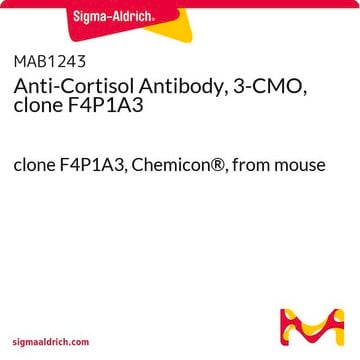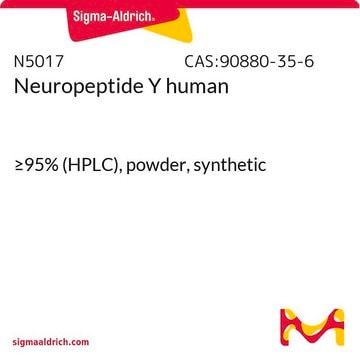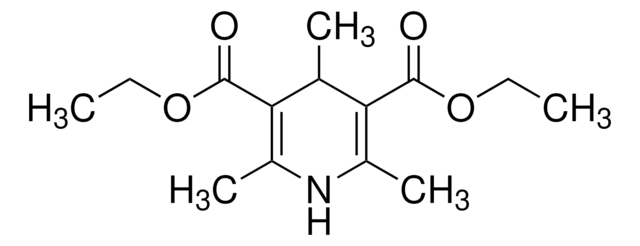AB1297
Anti-Corticosterone Antibody
serum, Chemicon®
About This Item
Produits recommandés
Source biologique
sheep
Niveau de qualité
Forme d'anticorps
serum
Type de produit anticorps
primary antibodies
Clone
polyclonal
Espèces réactives
rat, human
Fabricant/nom de marque
Chemicon®
Technique(s)
ELISA: suitable
radioimmunoassay: suitable
Conditions d'expédition
wet ice
Modification post-traductionnelle de la cible
unmodified
Catégories apparentées
Spécificité
Cross-reactivity: 11-dehydrocorticosterone 0.67%, Deoxycorticosterone 1.5%, 18-OH-DOC <0.01%, Cortisone <0.01%, Cortisol <0.01% and Aldosterone 0.2% by RIA.
Cross-reactivity: 11-dehydrocorticosterone 0.35%, Progesterone 0.004%, 18-OH-DOC 0.01%, Cortisol 0.12%, 18-OH-B 0.02% and Aldosterone 0.06% by ELISA.
Immunogène
Application
RIA: 1:60,000 (Sensitivity 10 pg/tube, 50% displacement 60 pg/tube separating free and bound using ammonium sulfate 10 50% saturation.)
Optimal working dilutions must be determined by end user.
Metabolism
Metabolic Hormones & Receptors
Forme physique
Stockage et stabilité
Informations légales
Clause de non-responsabilité
Vous ne trouvez pas le bon produit ?
Essayez notre Outil de sélection de produits.
Code de la classe de stockage
10 - Combustible liquids
Classe de danger pour l'eau (WGK)
WGK 1
Certificats d'analyse (COA)
Recherchez un Certificats d'analyse (COA) en saisissant le numéro de lot du produit. Les numéros de lot figurent sur l'étiquette du produit après les mots "Lot" ou "Batch".
Déjà en possession de ce produit ?
Retrouvez la documentation relative aux produits que vous avez récemment achetés dans la Bibliothèque de documents.
Notre équipe de scientifiques dispose d'une expérience dans tous les secteurs de la recherche, notamment en sciences de la vie, science des matériaux, synthèse chimique, chromatographie, analyse et dans de nombreux autres domaines..
Contacter notre Service technique






